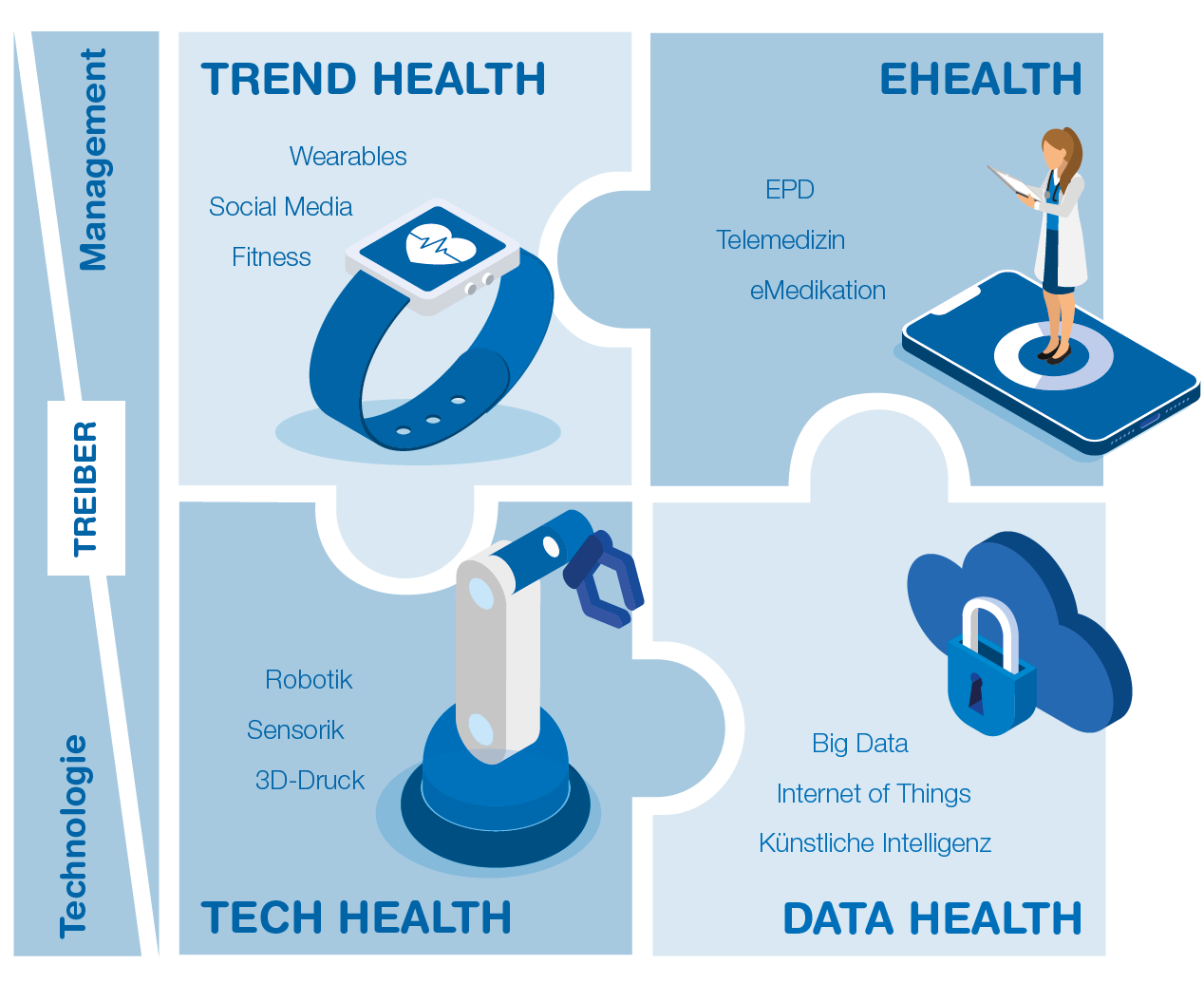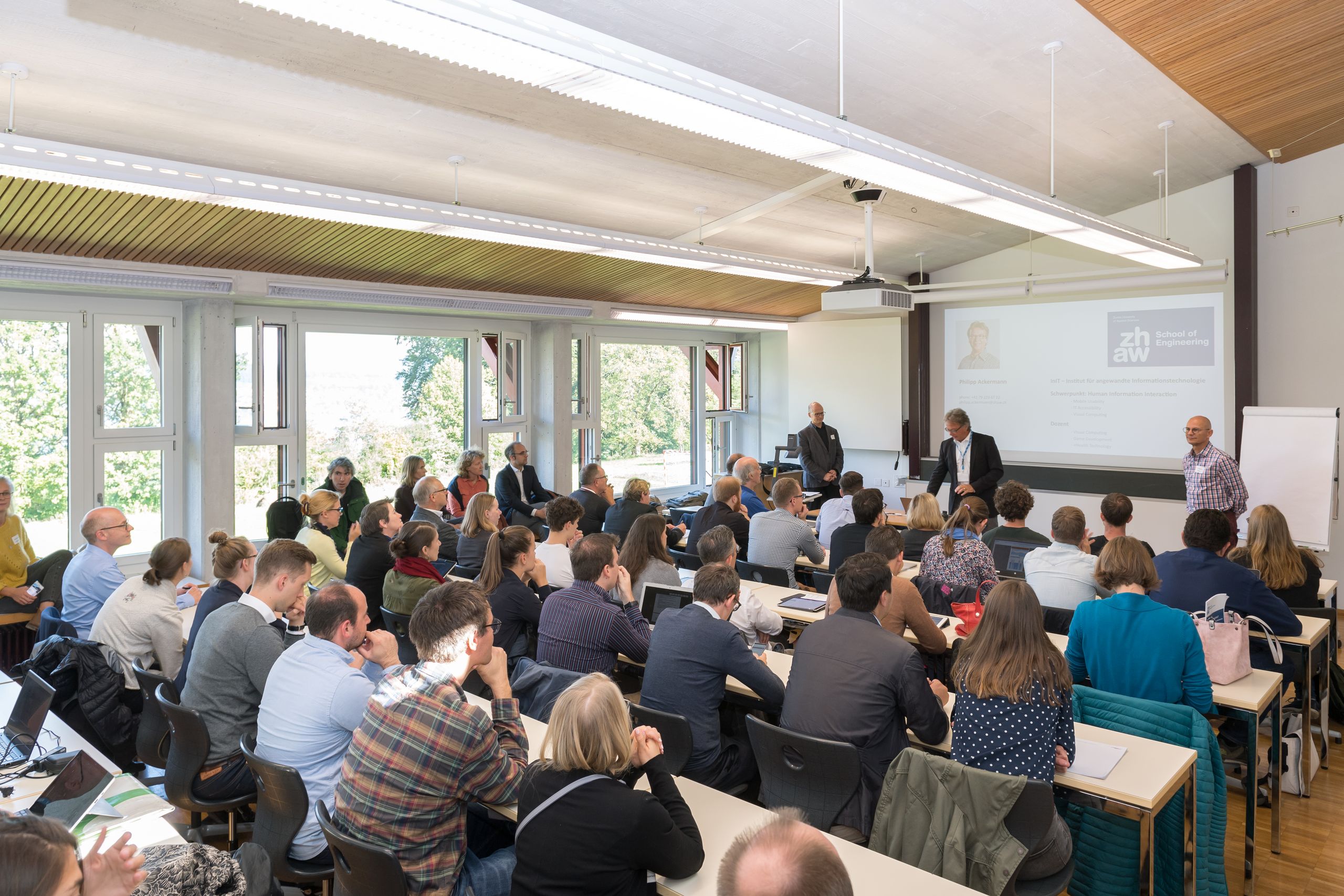"Digital health is coming"
Prof. Dr. Alfred Angerer teaches at the ZHAW School of Management and Law and heads the Healthcare Management department at the Winterthur Institute of Health Economics - he is also co-director of the Digital Health Lab. In this interview, he explains exactly what digital health is, what the future of our healthcare system will look like and what participants at this year's Digital Health Lab Day can look forward to in particular.
Prof. Dr. Angerer, your research focus at the ZHAW is "Digital Health". What is it about? How do you explain to a layperson what you are researching?
The topic is not difficult to understand. Digital health is the use of modern technologies in the healthcare sector. The aim is firstly to improve quality, secondly to reduce costs and thirdly to better meet the needs of patients.
You manage many projects. Can you explain a few examples of specific implementations? Where is digital health already being used today?
Digitalization has now arrived everywhere in the healthcare sector. When people think of digital health, they often think of operating robots and artificial intelligence applications. This is not entirely wrong, as pilot projects are already underway. When you call the emergency services in Copenhagen, for example, it's not just a person listening, but also a machine. The software analyzes what is being said in real time, presents possible diagnoses and suggests to the emergency call handler which follow-up questions they should ask. Less spectacular, but extremely helpful, are many electronic solutions that are gradually making their way into our everyday lives. Think of booking appointments with the doctor via the Internet. Or an app that you use as a diary during pain therapy.

Prof. Dr. Alfred Angerer lectures at the Institute of Health Economics at the ZHAW and founded the Digital Health Lab together with two colleagues.
Where do you currently see the most (untapped) potential?
Our research shows that three major areas will change substantially as a result of digitalization: Firstly, patients will be "empowered" and will be able to help themselves in many cases. Think of an app that allows you to determine for yourself whether a headache warrants a visit to the doctor. On the other hand, the flow of patients through the system can be optimized and their contact with the individual organizations can be changed. A video conference with a doctor is an example from telemedicine. Last but not least, core medical activities will benefit greatly from the technology. For example, a doctor can use software to make an accurate diagnosis much more reliably.
Advancing digitalization can be a particularly big challenge, especially for older people. To what extent does digital health also improve the lives of people who are not digitally savvy?
In our projects, we find time and again that it is not age but attitude that is decisive when it comes to making friends with digital health solutions. In order for such a solution to be accepted, it is essential to demonstrate its benefits. For example, if a diabetic no longer has to draw blood every day, but can read her blood sugar levels via a light sensor without a needle prick, the benefits are very obvious.
The topic of health has taken on a new significance as a result of the coronavirus pandemic. To what extent has the pandemic promoted developments in the field of digital health?
This is a very good question, which we have examined in depth in our forthcoming Digital Health Report. The short answer is: we can't prove it one hundred percent yet, but all the signs point to the fact that there has indeed been a sustained boost for digitalization. We know of telemedicine providers that had seven times more consultations in some cases. In some hospitals, IT project funding even increased tenfold for a short time. But the most important progress was that the wall in the minds of many was torn down. Orthopaedic hospitals such as the Schulthess Klinik in Zurich suddenly offered physiotherapy sessions online. Just two years ago, they would probably have been laughed out loud for this, but during lockdown it became the new normal.

From pedometers to artificial intelligence - digital health is used in a wide variety of fields.
Many companies - both employers and employees - have been hit hard by the pandemic. Has corona perhaps brought new aspects of digital health to light?
Corona has clearly shown us that teleworking, i.e. working from home, is justified, but also has clear limits. Technically, working from home is not a problem for many people. Some managers had to realize that it is possible to do an excellent job without being on site. In terms of occupational health management (OHM), however, teleworking is much more than just a question of technology. What it does to our (mental) health in the long term still needs to be researched in detail. But I can already imagine the following answer: Teleworking is not equally suitable for everyone; a mixture of face-to-face work and teleworking is probably the happy medium for most of us.
"Winterthur has a good mix of big players and small, innovative start-ups."
Who are the main players when it comes to development in this area?
For Switzerland, it's safe to say that it's the individual private organizations and not the public sector. On the one hand, the innovations are coming from start-ups that are trying out completely new approaches. On the other hand, I have recently seen more and more hospitals taking the topic more seriously and employing innovation managers, for example. What worries me is that some topics, such as the electronic patient dossier, are too big and unprofitable to be left entirely to the free market. I would really like to see more central impetus from the federal government in this area.
What role does Winterthur play in all of this?
I think Winterthur has very good conditions for companies that want to drive forward the topic of digital health. It has a good mix of large players (service providers, insurance companies, technology providers, university institutes) and small, innovative start-ups. But networking is even more important than just having lots of players. In my experience, the players in Winterthur are very uncomplicated - it's very easy to get into conversation and ultimately into business.

One of the workshops at the first edition of the Digital Health Lab Day.
How do you perceive the regional start-up scene? Is anything happening in this area?
Last year, we conducted a survey among Swiss digital health start-ups. Of the 42 start-ups that took part, 57 percent came from the canton of Zurich. This shows impressively how attractive and important the greater Zurich area is for the digital health scene. The topic will continue to occupy us intensively in the future. The "Digital Health Center Bülach" is also being built in the immediate vicinity of Winterthur. Together with the Technopark Winterthur, we have very attractive activities for start-ups in the area. I would also like to include the many offers and collaborations from the Digital Health Lab.
Let's go straight to the Digital Health Lab. Who is behind it?
The great thing about the ZHAW Digital Health Lab is that, like start-ups, it was created organically at the university. The core idea was driven forward by me together with my two fellow professors Sven Hirsch and Markus Melloh. We are now more than 80 ZHAW members working on all facets of digital health. Almost all disciplines are involved, from technology, health sciences, psychology and linguistics to health economics - you can find an expert in every field in our circles.
"Corona has clearly shown us that teleworking, i.e. working from home, is justified, but also has clear limits."
To what extent can independent SMEs and companies benefit from the work of the Digital Health Lab?
We are very happy to work with industry on numerous projects, whether large or small. Our contribution is varied, but differs greatly depending on how far along the partner's idea is. In some projects, for example, where finished products already exist, the aim is to scientifically test their actual effectiveness. For example, we measured for a small start-up whether the processes in the operating room of the Graubünden Cantonal Hospital can really be improved with a new digital health solution. Other players, on the other hand, approach us at an earlier stage - they then only have a rough concept. Here we can help to refine the concept, create technological prototypes and test the application in everyday life.
"In Winterthur, I find many people to be uncomplicated, easy to talk to and ultimately do business with."
The theme of this year's Digital Health Lab Day is "Implementing Digital Health Innovations" - what added value can participants expect?
I see three main advantages: Firstly, we have a very broad thematic focus, which is why participants can get to know the wide world of digital health. Secondly, most of the projects presented are very practice-oriented; it's not about gray theories, but about solutions for the healthcare system here and now. And thirdly, it is a very social event. It was important to us to have a real exchange through interactive workshops and a face-to-face event.
About the event: Who is it aimed at and will it take place physically or virtually?
It is an event for anyone interested in digital health. No matter where you are on your digital health journey, you will find something of interest there. Part of the event will be virtual, but another part will also take place physically. However, online attendance will only include the keynote speeches. So if you want to attend the workshops and take part in the important social exchange, you should definitely be there in person.
In your presentation, you present the "Key Insights from the Digital Health Report 2021". Can you already tell us something about it?
My children would say: you can't spoil anything! But I can reveal this much: the trends from my last report in 2017 have been confirmed again. Digital health can continue to make a good contribution to quality in the healthcare sector. There was one new trend that was very surprising for us, but I'd rather not reveal it just yet.
What are you looking forward to the most?
Quite honestly: having an aperitif with a beer in my hand and talking to real people again - completely analog.
Let's look a little further into the future. What could the future of healthcare look like? Which scenarios are realistic?
Of course, but I can only really see one scenario: digital health is coming! However, the speed is debatable. In our surveys, we always get very different answers as to how quickly artificial intelligence will become established, for example. However, all experts agree on one point: there is no need to be afraid of a cold, technocratic future. The empathetic specialist who takes time for me and my health concerns will still be around in the future.
"You don't have to be afraid of a cold, technocratic future."
Do you have a particularly exciting project in the pipeline that could be of benefit to the people of Winterthur?
We are in the process of completing a computer-based simulation for the Winterthur vaccination center in Töss. We have created a true-to-scale model of the vaccination center on the computer, where we can run many small virtual males, the vaccinees, through. With the help of such models, we can optimize processes, identify bottlenecks and calculate "what-if" scenarios. Such simulations will help the city to set up vaccination centers even more effectively and efficiently in the future.
Let's come back to Winterthur. Is there a place in Winterthur that you like to visit to recharge your batteries and be inspired?
I'm a big fan of the woods and there are quite a few of them in Winterthur! I'm most likely to be found jogging around the Ebnet. With all the digitalization, you shouldn't completely forget the beautiful analogue world.
Further information on the 3rd Digital Health Lab Day can be found here.

Alfred Angerer can switch off and enjoy the analog world while jogging in nature.
Interview with: Catherine Zimpfer and Linda Stratacò, August 2021









